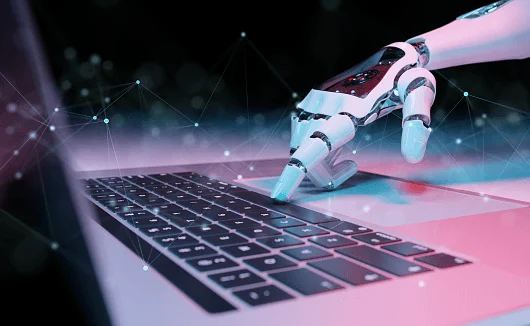Artificial intelligence (AI) has emerged as a force of transformation for various industries in today's rapidly evolving digital landscape. This transformation makes things easier across sectors and gives an idea of how AI will shape the future. Thus, some jobs exist either because of AI or to complement the use of AI, and they are often called "AI Jobs." However, some fear that this force of transformation will soon kick many out of their jobs. Contrary to this belief, AI jobs seek to make things easier for man and create new opportunities to improve the quality of living for all. In this article, you will discover how AI enhances careers rather than destroys them, as many perceive. You will also learn how to take advantage of the boundless opportunities in AI.
The Role of AI Jobs in Enhancing Careers

The mechanism of AI already gives the idea that it is created to enhance existing careers and not destroy them. AI works with algorithms that are made based on human interactions with machines. Hence, "machine language" is always used in AI jobs. The term implies that the device is being taught to learn a particular language or call them "human repetitive actions" or "activities" to automate it and imitate human responses. This idea already implies that AI jobs need human interference for them to work perfectly to solve human problems. Else, how will it solve the problems it doesn't understand? Thus, AI complements your job; it is not there to take it away. The fantastic thing for you as a professional is that you can hire machine learning companies to help you create an AI that will make your job easier.
The demand for AI is increasing, no doubt.Research by IDC revealed that global spending on AI is expected to exceed $110 billion by 2024. Ignoring AI or running away from it would be a great disservice. You can leverage AI to streamline your operations, optimize your processes, and gain valuable insights from large amounts of data that would have taken you lots of time to get. As a business professional, this is the best time to jump on the wagon of AI jobs to improve your processes and the quality of your living.
Here are some of the ways AI will improve careers.
Increased productivity
Productivity is the measure of output per the amount of input expressed in a ratio. AI jobs help you achieve more excellent results with less information regarding human efforts. This feat is achievable by operating an AI technology called deep learning. Deep learning is a field of machine learning that involves training artificial neural networks on vast amounts of data sets to recognize recurring patterns and make decisions based on those patterns.
Thus, you can leverage AI tools to automate your processes, which helps accelerate your organization's productivity progress. However, the concern here is “if AI is trained to make technical decisions, what is my place as a professional?” Rather than becoming obsolete, you move up the productivity radar to focus on making strategic decisions that drive the organization forward. These decisions will become the template on which the AI technology will work. It implies you don't need to spend more time on technicalities; you can trust AI software to handle that.
Personalized learning and skill development
AI-based learning platforms can offer customized training and development plans suited to particular professionals' requirements and preferences. AI can suggest relevant courses, tools, and exercises assist professionals in picking up new skills and keeping up with industry trends by assessing their learning patterns and performance. Professionals can improve their skills, advance their career prospects, and adapt to the always-changing job market with the help of this individualized learning technique. Top players in the artificial intelligence space leverage this advantage to stay at the top of their game.
Advanced risk management
AI jobs give more attention to can risk management. The AI technology recognizes potential dangers, reviews prior data, and projects future scenarios. It also enables professionals to identify and reduce risks proactively while making wise decisions to safeguard their businesses and careers. Early alerts, anomaly detection, and process optimization are all capabilities of AI-powered risk management technologies. Professionals may handle uncertainties, reduce possible losses, and improve their reputation as proactive and dependable experts in risk management by utilizing AI's predictive skills.
Effective communication
Natural language processing (NLP)-based AI jobs make it easier for professionals to communicate effectively with clients or coworkers. Chatbots and virtual assistants with NLP capabilities can comprehend requests, respond with information, and speed up dialogue. These AI-driven communication solutions increase customer service, response times, and cooperation, empowering professionals to forge stronger connections and advance their reputations in their fields.
Conclusion
In contrast to the worry that AI will eliminate jobs, the growth of AI jobs opens up a world of opportunities. AI improves careers by automating repetitive jobs, increasing productivity, and allowing experts to concentrate on higher-value work. The advent of hybrid occupations, which combine AI competence with domain-specific knowledge, has opened up new career paths. You can position yourself for the plethora of chances in the AI employment market by upskilling with AI skills and learning to make your business stay ahead with these skills.
The secret to utilizing AI technologies to their full potential is a collaboration between humans and AI. As a professional, you should view AI as a useful tool that enhances and expands your capabilities. You may ensure AI's ethical and inclusive integration in your career by adhering to responsible AI practices and ethical considerations.
AI jobs are at the vanguard of this revolution as the nature of labor changes. We can prosper in a world where humans and AI collaborate to build a better future by embracing the opportunities given by AI jobs and developing the appropriate skills.
.svg)




